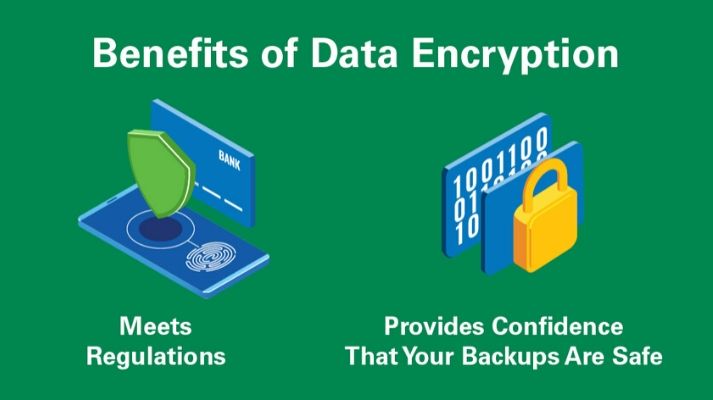Encryption is a way for companies, both large and small, to protect their users against any harm that might come from giving out their personal information. Especially when credit card and other payment information is being collected, encryption is vital. Encryption security is part of the front line of defense against privacy breaches that can destroy a company.
What Is Encryption?
Encryption is a process that encodes information so that it is unreadable unless decrypted by someone with knowledge of the decryption key. Encryption can be as simple as changing letters around to adding advanced computer algorithms that need a key to be deciphered. The actual encrypted message is referred to as "plain text" while the message in its indecipherable form is referred to as "cipher text."
How Does Data Encryption Work?
Data encryption works in the same way that a key works with a lock. When someone wants to break into a building, an effective door and locking system can be a great deterrent. With a key, entry is as simple as putting it in and twisting. But a person without a key must find a different way into the building.
With data encryption, the "decrypting key" is vital. The person with this key is the person who is supposed to be able to unlock the meaning of the text. For an example of how encryption works, take the word "credit." To encrypt the word credit, you could use a simple replacement code. The letters "ikpqvb" could be the encryption used. The problem with this is that a simple replacement code is too simple for other computers since there are only 26 possibilities that each letter could be.
To make this code more difficult to crack, coders began using a "shifted" alphabet so that rather than 26 possibilities for each letter, there could be hundreds or thousands of possibilities. The key would be made based on each letter being given a numeric value. This worked well until computer programmers caught on and figured out how to crack these codes as well.
In the digital age, these encryptions continually grow in their randomness and effectiveness. With numeric binary code, rather than letters and cryptographic algorithms coming into play, information can be kept very safe. As you can tell, however, it is vital that the encryption stays ahead of a hacker's ability to break a code.
Multiple Approaches to Encryption
Multiple approaches to encryption are vital because there are so many different ways that information is given online during the payment security process. The encryption application must be placed at the right point in the payment process and this could be different depending on the type of payments a company receives.
For instance, Session Encryption is important if information is being passed throughout the e-commerce process. While a person is shopping on a company's site, their information is being stored on a server during that process. The actual gateway of communication between the customer and the company should be encrypted so that data cannot be stolen en route.
Actual "Data Encryption" is the obvious approach to encryption. It is important because the actual information that is being passed needs to be encrypted in case it is stolen en route to the server. Every word and every number should have high level encryption so that a person's private information is kept secure.
One of the most effective methods for devaluing and securing credit card account data is called tokenization. This is when a credit card number is "replaced" with encryption tokens or placeholder numbers for the duration of the payment process. The real number is given to begin with, but that number is immediately stored in a high-security vault and then replaced with the "token numbers." The real number is then only in play for a moment before being replaced.
Benefits of Data Encryption

The benefits of encryption are numerous. Here are just a few.
Encryption helps you meet regulations
Cardholder data and personal information have always been protected, but laws are getting more stringent every year. As the world becomes increasingly digital, new regulations are needed to keep up with the trend. While not all standards mandate encryption, including encryption security as part of a multi-pronged approach to processing payments securely and following PCI DSS Standards is the best strategy for keeping information private.
Encryption provides confidence that your cardholder data is safe
Working with a solution provider that leverages encryption to protect cardholder data is a great way to protect yourself and your clients. Payment solutions that leverage encrypted point-of-interaction devices and secure software of a service shields the solution provider and merchants from handling clear text cardholder data. This can greatly reduce the scope and complexity of a PCI-DSS assessment.
Encryption and PCI Compliance
The principles of PCI DSS are vital.
There are six major principles or goals that ISVs should strive for to accomplish PCI compliance:
- Build and maintain a secure network
- Protect cardholder data
- Maintain a vulnerability management program
- Implement strong access control measures
- Regularly monitor and test networks
- Maintain an information security policy
While the PCI data storage standard is comprised of 12 requirements, the previous six principles will help a company accomplish them.
Conclusion
At Global Payments Integrated, our EdgeShield Security Bundle provides advanced security services intended to protect credit card data, prevent counterfeit fraud, and enhance payments security. Through a unique collection of complementary security solutions, EdgeShield delivers one of the industry’s most secure payments platforms, combining EMV, encryption, and tokenization. When integrated into systems that accept payments, the bundle protects credit card data while at rest and in transit. To learn more about our security solutions, contact us today.

